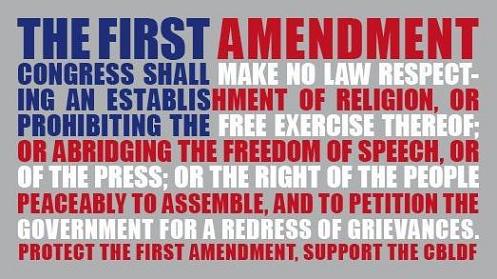
Michael J. Katz
Last year a judge eviscerated an orthopedic expert in open court for being a liar. A legal blogger reported it. And now that expert has taken his wrath out on the blogger by suing him for defamation.
And it turns out that I’m the blogger that reported it, and last week suit was filed against me to the tune of $40 $200* million. This is the story.
You remember Dr. Michael Katz, don’t you? He’s the defense expert I wrote about last year that was subjected to the deeply lacerating comments of Justice Duane Hart, who called him a liar from the bench. And when I say he called him a liar, I mean that he did it many, many times and used the word “perjury” to describe the testimony.
The judge also, apparently, used the phrase “Typhoid Mary” in addition to “a liar and a thief,” and invited the attorneys in the courtroom to spread the word that Dr. Katz had been caught lying, according to the suit.
Just to be clear, as we start here, I had no role in that litigation. Rather, the boundaries of the suit concern my reporting on what transpired in the courtroom and offering my opinions on its significance.
The basis of Justice Hart’s wrath against Katz was a medical-legal exam that Katz did on behalf of a defendant in a personal injury suit. Two issues arose from it.
First, that the brief nature of the physical exam — an orthopedic exam of the shoulder that lasted, according to the transcript of the proceedings, one minute and 56 seconds, but you can view it yourself here on YouTube — conflicted with Katz’s claim that his customary and usual exam was 10 to 20 minutes. The surreptitiously recorded video also shows a couple minutes of history being elicited and the doctor asking what hurt.
Second, and apparently far more important to Justice Hart than the time it took to do the exam, is that he didn’t believe Katz did all of the tests he claimed he had done in that brief period. How do we know that was the most important thing to Justice Hart? Because Katz quotes him saying so in the Complaint.
Katz, according to the judge, makes millions of dollars doing these so-called “independent” medical exams, or IMEs.
I reported on those court proceedings and some of Justice Hart’s lacerating remarks, as well as a subsequent court appearance before him, and reported the judge’s statements that he was going to refer Katz to the District Attorney for criminal investigation, to the administrative judge to commence civil contempt proceedings and to the Office of Professional Medical Conduct to investigate action against his medical license.
That’s a lot of whoopass.
Dr. Katz concedes in his Complaint that Justice Hart made heaps of cutting comments about his integrity, and has now agregated them into one place. This includes comments Justice Hart made both on the record and, allegedly, off.
In Katz’s recitation of facts in the Complaint — a stark re-telling of a jagged wound being ripped open by a judicial gavel — it is asserted that Justice Hart said (¶75)…:
off-the-record, that Dr. Katz’s career doing IME work might be over, calling him a “no good liar,” and told him to retain a lawyer.
And that (¶ 77):
He threatened Dr, Katz with criminal prosecution and imprisonment multiple times, off-the-record, throughout the morning.
And this (¶79):
The doctor’s career doing IME’s might be over. If he gets caught in a lie on something that’s material at trial his future use to anyone is useless, correct? That will follow the doctor forever.
And that Justice Hart said (¶82):
I would strongly suggest you do not do anything because you’re in more trouble than you think. It’s probably that your career doing IME’s is over. It’s possible, unless this case is settled, that I might be taking more – the attorneys have a duty basically not to do anything with regards to the district attorney. If I find out or if I even suspect something is going on I have a duty to get in touch with the district attorney and getting in touch with the district attorney is not a good thing for you in this case. Understood?
And that this occurred in the presence of Katz’s criminal defense attorney who subsequently appeared (¶84):
Justice Hart announced, in open court, but off- the-record, “Your client is a liar and a thief.”
And this (¶95):
During the court appearance, despite stating that he would seal the record in exchange for a settlement, Justice Hart actively invited other attorneys who were present, or even in the courtroom on unrelated business, to order copies of the transcript in order to “spread the word” concerning Dr. Katz’s alleged perjury.
And this (¶98):
Justice Hart referred to Dr. Katz as “Typhoid Mary” and accused him of “getting caught red-handed in an out-and-out lie,”
And this (¶99)
he gave a laundry list of tests that he did…Did he perform those tests in whatever time he did [sic] that he testified to? No.”
And this (¶120):
Off-the-record, Justice Hart continually pressured Dr. Katz to state on the record he would no longer practice “medical-legal” examinations, repeatedly berated Dr, Katz, stating that “his career was over,” and even stated that defendants’ counsel wanted to “tear [Dr. Katz] a new asshole.”
And this (¶128):
Again counsel, it is not the time so much if the doctor thinks he can explain the time. It is not the time problem. It is that there are tests that he testified to that he didn’t do. That is the perjury.
And this in trying to persuade him to retire (¶128):
I unsealed the record. Everybody from now on when he testifies as to the tests that he performed, it is always going to be questioned from now on. After about a month or two, nobody is going to go near him anyway. So he is not giving up much. What he is giving up is me referring it to the District Attorney and to the Administrative Judge. I would think that he wants to consider it again. Nobody is going to go near him.
And this to his criminal defense lawyer (¶130):
It is that the tape shows that he didn’t do the tests that he spent a considerable amount of time talking about that he did. That is the perjury. Yes, he didn’t do the tests. It is not just me saying it. It is not just the plaintiff saying it. The defendants are saying it too. Does your client really think if the insurance industry or some of the insurance companies that hired him before when they find out he lied, do you really think they will go near him?
In other words, the damage to Katz’s reputation were based on the exceptionally sharp comments of Justice Hart. The was brought on, according to the judge, by Katz’s conduct.
But Katz can’t sue the judge. Hence the title of this post, Shooting the Messenger, for I was the one to report it.
I ask you dear reader, is this not newsworthy? Especially in light of Katz’s claim that he has “testified in countless personal injury and medical malpractice cases as an expert witness, most often for defendants, over the past twenty years” (¶10) and that he was “one of the premier expert witnesses in the field of orthopedic medicine” by the time this case came up (¶41) and that he was “a highly regarded expert witness in the area of orthopedic medicine” (¶44).
So, if you take his self-description at face value, yes, the trauma to such a person’s integrity by a judge would certainly seem to fit any definition of newsworthiness.
Katz also claims in his lawsuit that “there is no indication” Justice Hart carried through on his statement that he would refer him to the D.A. or to the Office of Professional Medical Conduct (¶22). Maybe he did, maybe not, I have no way of knowing since investigators don’t generally blab about what they are investigating. And apparently, Katz doesn’t know for sure either.
But then, quite oddly, he repeated this mantra of the judge allegedly not subsequently reporting. He repeated it many, many times. As if the judge’s conduct subsequent to publication was important. This is a sample from the Complaint:
149. Turkewitz also falsely stated and implied that Dr.Katz was being investigated by the Attorney General’s Offîce and the Office of Professional Medical Conduct despite the fact there was no evidence of any such investigation when Turkewitz published his blog posts.
Given that Katz had already quoted the judge saying he was going to do exactly that — report him to the D.A. and Office of Professional Medical Conduct — it is bizarre to complain that I reported it. How can it be defamatory to report on what a judge said?
This is one of the many comments that Katz himself quotes of Justice Hart on the issue (¶124):
Let the record reflect that I gave Dr. Katz the option of and I would institute a special proceeding to retire from the medical/legal business. Retire at the time and he has declined. What I am now going to do, I am going to order a full transcript of everything, the trial and the subsequent proceedings. I will present that to both the administrative judge of Queens and the District Attorney. I would recommend to the District Attorney that they explore prosecuting Dr. Katz for perjury.”
This dumping of crap into a complaint indicates a person scrambling to find an issue somewhere, someplace. And it reminds me of a post I wrote last year, on the importance of lawyers saying “no” to potential clients. Lousy defamation cases happened to be one of my examples.
Vetting a new case is important. The fact that a potential client has hurt feelings because a judge said mean things about him, and it was reported, is not enough to sustain a defamation lawsuit. Not in the United States, anyway.
In my postings I offered not only my opinions on why the potential legal troubles were significant to Katz, but more importantly, offered my opinions in a series of posts about why I thought this was one piece of evidence of pervasive insurance fraud that I believe is ongoing by the insurance companies themselves. I’ve called for an investigation by New York State Attorney General Eric Schneiderman or NYS Financial Services Superintendent Benjamin Lawsky (as he oversees the insurance industry).
You may consider these calls for an investigation my petition for redress of grievances.
And now I’ve been sued for my efforts. That’s right, sued for reporting on proceedings in open court and offering my opinions.
 I think that most people with even a rudimentary understanding of our First Amendment would know that such a suit is verboten. And certainly anyone that has gone to law school must know this. Because both the freedom of the press and the right to petition for redress of grievances are two our First Amendment freedoms.
I think that most people with even a rudimentary understanding of our First Amendment would know that such a suit is verboten. And certainly anyone that has gone to law school must know this. Because both the freedom of the press and the right to petition for redress of grievances are two our First Amendment freedoms.
And lest the part about a free press be unclear, New York has its own Civil Rights Law § 74 that makes it even clearer, though Katz and his counsel seem to be blissfully ignorant of it:
A civil action cannot be maintained against any person, firm or corporation, for the publication of a fair and true report of any judicial proceeding, legislative proceeding or other official proceeding, or for any heading of the report which is a fair and true headnote of the statement published.
The Complaint makes some other patently idiotic allegations, such as this one (¶25):
Turkewitz attempts to generate interest in his site by posting seemingly provocative and/or scandalous material.
Even if was true true — and the ABA Journal apparently didn’t think so when it kept picking me for its Blawg 100 and selected me for its Blawg Hall of Fame, based on being “a great source for news and commentary” — what difference would it make?
Is the citizenry supposed to curtail opinions because a writing is provocative? Can anyone else hear Thomas Paine laughing? Has anyone seen cable “news” shows lately or listened to talk radio? Rush Limbaugh (and a gazillion others) would shrivel up and die if he couldn’t be provocative or scandalous.
So where is the gravamen of the complaint against me? It is by this type of allegation (¶27):
Turkewitz falsely stated and implied, among other things, that Dr. Katz had committed perjury, fraud and was guilty of racketeering. Turkewitz’s blog posts were intended to create the impression that Dr. Katz had been charged with and/or convicted of criminal perjury and other crimes which would make him unfit to act as an expert witness.
The problem with the allegation is that I never said he was convicted of anything. And Katz’s lawyer knows that, which is why there is no quote of me ever writing such a thing. But it does get repeated many times, as if repeating it like some talismanic incantation will magically make it truthy.
And then there is this one (¶28):
Turkewitz’s blog posts go so far as to expressly compare Dr. Katz to a “convicted felon” and a “prisoner.” Dr. Katz was not charged with or convicted of any crimes.
Nope. Missed again. There is a reason there is no real quote from me. Because this is what I actually wrote about witnesses in general (with reference also to Dr. Robert Israel, who has his own problems from medical-legal exams):
Defense attempts to preclude Drs. Katz and Israel from testifying in future trials seem doomed to fail. They are, after all, eyewitnesses to injuries. If a convicted felon came upon a car accident shortly after it happened and saw injuries, would he be precluded from testifying simply because one side or the other didn’t like his testimony? If he saw the injuries a month or year later, would he magically be precluded? Are prisoners precluded from testifying? Making matters worse for those that hired these doctors over the years is that they are responsible for creating them as witnesses.
While the medical-legal examiner is an expert that can give opinions, s/he is also a fact witness as to what transpired on a particular day. A fact witness is a fact witness. It matters not if the witness to a collision is a nun or a felon, or the witness is a doctor hired to defend a lawsuit. The only question is whether the witness is available to testify.
And my opinion is shared by my co-defendants, Paul Kassirer at defense firm Lester Schwab. Kassirer is quoted in the Complaint with having sent my initial posting about Katz via email to other defense lawyers with this comment (¶212):
“More to the point, even if he is eventually arrested and convicted of perjury, NY law is clear that he is not legally ‘unavailable’. Accordingly, whoever has retained him will not be entitled to another IME. As long as he was licensed and was competent at the time of the exam, he can testiff and therefore is not ‘unavailable.’
And this is all backed up by New York law, as Katz is certainly not the first witness to experience legal or credibility issues. On February 27th of this year, Justice David Schmidt in Brooklyn dealt with this exact issue regarding Katz, and concluded that the defense attempt to preclude his testimony must fail. In Atchinson v. Metropolitan Enterprises, he wrote, after describing the comments by Justice Hart:
“[t]he defendants’ concern that the plaintiff may impeach the examining physician’s credibility … [is] not a sufficient basis to compel a second examination” (Carrington v Truck-Rite Dist. Sys. Corp., 103 AD3d 606, 607 [2d Dept 2013], citing Schissler, 289 AD2d at 470; Futersak v Brinen, 265 AD2d 452 [1999]). The instant facts are analogous to the cases of a public attack on the professional credentials of an IME physician; such cases hold that instances of compromised professional integrity do not warrant a subsequent IME (see e.g. Giordano v Wei Xian Zhen, 103 AD3d 774, 775 [2013] [fact that examining physician was arrested and surrendered medical license subsequent to examination and note of issue filing does not justify additional examination]; Carrington, 103 AD3d at 607 [same];Schissler, 289 AD2d at 470 [fact that examining physician was subjected to professional discipline subsequent to examination and note of issue filing does not justify additional examination]; Futersak, 265 AD2d at 462 [same]). Defendants advance no authority suggesting that the present situation concerning Dr. Katz is distinguishable because he has been accused (as recorded in a court transcript) of perjury.[5]
In the subject heading, I wrote that I’ve been sued “again.” I was sadly, dragged into the Rakofsky v. Internet fiasco. My response in that suit was to say, “go shit in a hat and pull it down over your ears,” though I did offer the pseudo-legal latin version for those that want lawyers to speak pretentiously: vade et caca in pilleum et ipse traheatur super aures tuos.
In that post, I also detailed the other times I was threatened. I’ve also defended another defamation suit with a take-no-prisnors attitude. It has never ended well for those that threatened or sued.
Was filing this suit a dumb thing to do? Yes, on multiple levels.
First, if Justice Hart didn’t previously report this matter to the D.A. or the Office of Professional Medical Conduct, this suit may act as a reminder.
Second, Katz has now further publicized the vicious tongue-lashing that he received from a judge. I learned about it from a New York Post reporter, and that call was followed up by a Daily News reporter, both the day after it was filed. Who alerted them?
By suing the messenger, Katz invites not only repetition of the claims he has catalogued, but enormous backlash from free speech advocates. There are a great many people who don’t take kindly to frivolous defamation claims and the chilling of free speech that often comes with them. There is a fair chance that those who did not previously know about Katz, will now learn.
Updated 5/28/14: Justice F. Dana Winslow has ruled on a motion in another case about whether Katz can be cross-examined on Justice Hart’s conclusions. The answer is, yes he can. The matter is Graser v. Dimeo, where Katz claims to have done a 45-minute defense medical exam.
This was the reasoning:
It is well settled that, for impeachment purposes, a witness may be cross-examined with respect to prior immoral, vicious or criminal acts which have a bearing on the witness’s credibility. Badr v. Hogan, 75 NY2d 629. The Court of Appeals has extended the rule beyond the “immoral, vicious or criminal’ categories to include prior conduct that simply demonstrates the witness’s “untruthful bent,” such as using an alias [People v. Walker, 83 NY2d 455], or publishing books advocating cheating [People v. Coleman, 56 NY2d 269].
The cross-examiner must have a reasonable basis in fact for asking questions about prior misconduct, and must do so in good faith. People v. Kass, 25 N.Y.2d 123; People v. Green, 272 A.D.2d 341. If the witness denies the prior misconduct, the cross-examiner may press the witness further, but is not permitted to introduce extrinsic evidence to refute the witness’s denial. Id., at 635.
In the case at bar, the Court finds that plaintiff has a reasonable, good faith basis, to cross-examine Dr. Katz regarding the truthfulness of his testimony in the Bermejo Action. Dr. Katz’s prior conduct need not have resulted in a formal adjudication of wrongdoing. It is enough that facts exist which tend to show a propensity for untruthfulness; that is that Dr. Katz gave false information in circumstances in which he was required to be truthful. See People v. Walker, 83 NY2d at 461. Plaintiff’s counsel may ask Dr. Katz about his testimony in the Bermejo Action and about the underlying facts which suggest that his testimony was false. Counsel may not, however, call other witnesses or introduce extrinsic evidence (such as the video recording), to refute Dr. Katz’s answers.
Although such inquiry may be prejudicial to defendant, the Court notes that if it weren’t, it would be of no use to the plaintiff. The question is not whether such inquiry is prejudicial, but whether it is unfairly or unduly so. The Court determines that it is not. Where, as here, the inquiry has a factual basis, and bears on the question of the witness’s credibility, it is fairly and properly allowed. See Castillo v. 62-25 30th Avenue Realty, LLC, 74 AD3d 1116 (allowing defense counsel to question plaintiff’s treating physician regarding underlying factual allegations that led to suspension of his license to practice medicine); Spanier v. New York City Tr. Auth., 222 AD2d 219 (allowing defense counsel to question plaintiff’s treating physician about prior allegations of improper billing).
The Court thus finds no basis to bar the cross-examination of Dr. Katz regarding the proceedings in the Bermejo Action. The nature and extent of such cross-examination is left to the discretion of the trial judge. See Badr v. Hogan, 75 NY2d at 634.
* While I originally wrote the suit was for $40 million, that should have been $40 million for each of five different causes of action for an aggregate claim of $200 million.
Elsewhere on the suit:
Simple Justice (Scott Greenfield):
This has nothing to do with the fact that Justice Hart found Katz to be a liar, of course, but it’s all that Turk’s fault because he posts “provocative and/or scandalous material.”
Legal Satyricon (Marc Randazza):
If Dr. Katz dared to file suit in Nevada, California, Oregon, or a growing number of other states with meaningful anti-SLAPP statutes, his litigation campaign would likely end post haste. It would be thrown out of court, and the judge would bruise his ego in the shape of the defendants’ attorneys fees and costs. But this is not California, or even Nevada – it is New York. Without meaningful relief, we are left only with the disinfectant of cleansing light shone upon those who file such censorious lawsuits.
 Dunkin’ Donuts finds itself in sticky trouble today as suit was filed against it for failing to put enough jelly in its jelly doughnuts. The class action, filed on behalf of all similarly aggrieved individuals, was filed by local attorney Harlan Wittenstein.
Dunkin’ Donuts finds itself in sticky trouble today as suit was filed against it for failing to put enough jelly in its jelly doughnuts. The class action, filed on behalf of all similarly aggrieved individuals, was filed by local attorney Harlan Wittenstein. In an email to me, a Dunkin’ spokesman said he was aware of Sinker’s suit, but that they had not yet been served with the papers. He went on to say, “We put exactly the amount of jelly in our donuts that we think they deserve. If Sinker doesn’t like it, she can start her own donut store. We’ll be happy to open a franchise next door to see who is favored by the public. We’ll even give away free samples for awhile to make sure people taste ours.”
In an email to me, a Dunkin’ spokesman said he was aware of Sinker’s suit, but that they had not yet been served with the papers. He went on to say, “We put exactly the amount of jelly in our donuts that we think they deserve. If Sinker doesn’t like it, she can start her own donut store. We’ll be happy to open a franchise next door to see who is favored by the public. We’ll even give away free samples for awhile to make sure people taste ours.”


